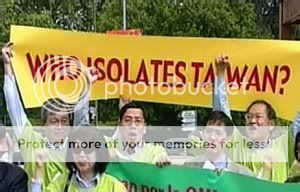Monday, May 31, 2004
China Update
It is difficult for those of us outline the political loop to know what is really going on with US-China relations. The Chinese embassy website recently ran an article about a phone call between President George Bush and President Hu Jintao, stating that China was reassured of our commitment to the One China Policy. But the article was published at the same time that the Xinhau news agency reported that the USA is interfering in China's internal affairs.
Indeed, the China-Taiwan issue continues to be the overriding factor in defining US-China relations. In this CC post, I describe some of the hopeful signs that China might be moving -- slowly, in their own way -- toward a more democratic internal organization, and conclude with some comments about the ongoing difficulties.

Participants in the meeting of the Political Bureau of the CPC Central Committee, presided over by General Secretary Hu Jintao, held that improving the transparency in village affairs and democratic administration of villages, as well as safeguarding the fundamental interests of villagers, constituted a major part of improving self-government by villagers and promoting socialist democracy.
It would also help to improve the Party's style of work, build a closer relationship between officials and the masses, and promote reform and all-round development of the rural areas.
Currently, 31 provinces, autonomous regions and municipalities in China have formulated procedures for the election of villagers' committees. The election of villagers' committees of the fifth or sixth terms have been completed in most areas.
More than 90 percent of the villages throughout the country have formed a system to publicize village financial and administrative affairs regularly.
BEIJING, May 31 (Xinhuanet) -- China is working on ways to ease restrictions on capital accounts, including lifting a ban on emigrants' transfer of legitimate assets abroad, a high-level foreign exchange official has said.
According to a document made available to Xinhua on Monday, Ma Delun, deputy director of the State Administration of Foreign Exchange (SAFE), said that China is also discussing lifting bans on transfer of legacy abroad by non-Chinese residents, further opening up capital markets, doing away with restrictions on cross-border transfer of foreign exchange capital by multinationals.
Ma also disclosed other measures being considered to further open China's capital market, including establishing a qualified domestic institutional investor (QDII) system and allowing social security funds to invest abroad.
The QDII system would allow domestic institutional investors to invest in capital markets abroad.
China has few restrictions on nearly half of 43 categories of capital market dealings as defined by the International Monetary Fund, said the official.These would suggest that there is a prospect for real, fundamental change in the internal political and economic organization of China. The first article indicates that they are moving toward greater reliance on local elections to determine leadership; the second indicates that the central government is making additional progress toward a free-market economy.

The article from Taiwan goes on to lay out the background for the argument that Taiwan should be permitted to join the WHO. The points of their argument, not coincidentally, parallel the arguments made by pro-independence Taiwanese. Thus, all three sides (China, Taiwan, and the rest of the world) see the controversy about WHO membership in symbolic terms, not merely practical terms.
The thing is, inclusion of Taiwan in the WHO would make sense, from a medical standpoint. This was illustrated well last year, during the SARS outbreaks. Thus, although inclusion of Taiwan might be seen as a symbolic acceptance of Taiwan as an independent political entity, it would be better for world health overall to set aside this concern. Perhaps doing so would ease tensions a bit, especially if no particular negative consequences ensued. If WHO inclusion were granted, and Taiwan wisely kept quiet about it, and the US and UN did not publicize it, it could show that practical concerns can outweigh the symbolic ones.
(Note: The Rest of the Story/Corpus Callosum has moved. Visit the new site here.)
E-mail a link that points to this post:



